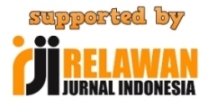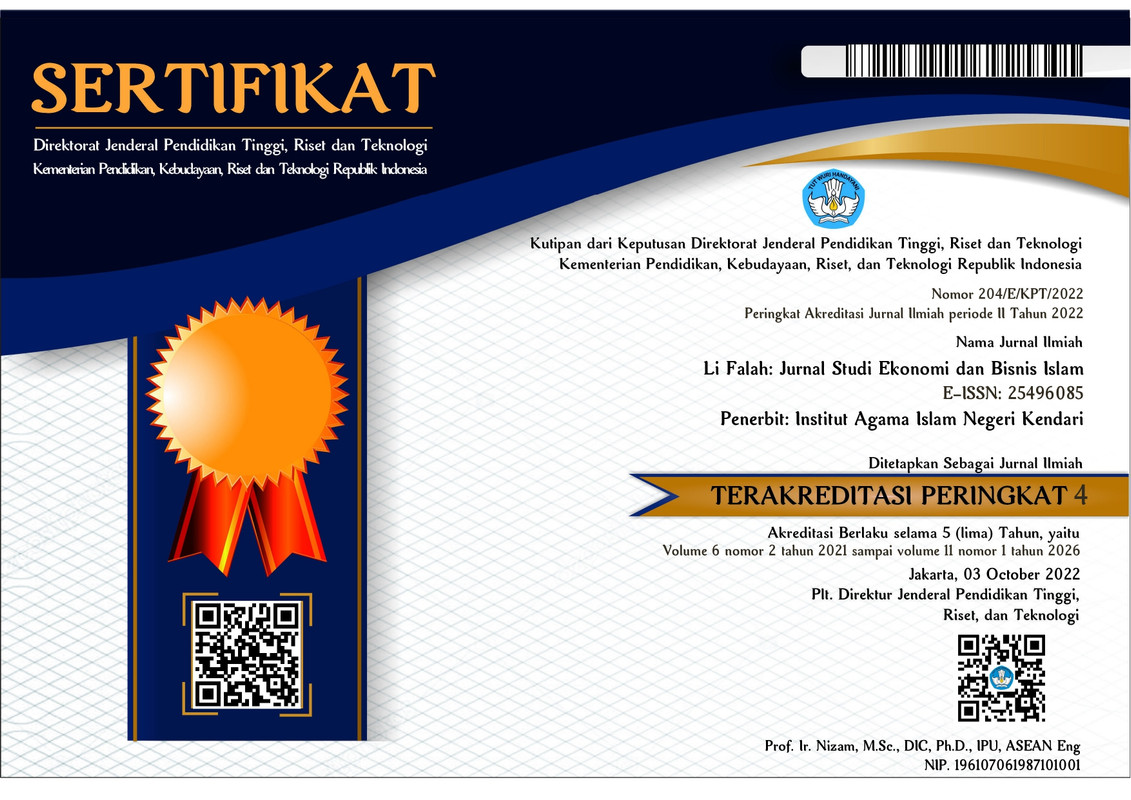Corporate Social Responsibility in Family Business: A Scoping Literature Review
Abstract
Keywords
Full Text:
PDFReferences
Aguinis, H., & Glavas, A. (2012). What We Know and Don't Know About Corporate Social Responsibility: A Review and Research Agenda. Journal of Management, 38(4), 932–968. https://doi.org/10.1177/0149206311436079
Antolín-López, R., Delgado-Ceballos, J., & Montiel, I. (2016). Deconstructing corporate sustainability: a comparison of different stakeholder metrics. Journal of Cleaner Production, 136, 5–17. https://doi.org/10.1016/j.jclepro.2016.01.111
Arksey, H., & O'Malley, L. (2005). Scoping studies: Towards a methodological framework. International Journal of Social Research Methodology: Theory and Practice, 8(1), 19–32. https://doi.org/10.1080/1364557032000119616
Astrachan, J. H., Binz Astrachan, C., Campopiano, G., & Baù, M. (2020). Values, Spirituality and Religion: Family Business and the Roots of Sustainable Ethical Behavior. Journal of Business Ethics, 163(4), 637–645. https://doi.org/10.1007/s10551-019-04392-5
Bansal, S., Lopez-Perez, M. V., & Rodriguez-Ariza, L. (2018). Board independence and corporate social responsibility disclosure: The mediating role of the presence of family ownership. Administrative Sciences, 8(3). https://doi.org/10.3390/admsci8030033
Baumgartner, R. J. (2014). Managing corporate sustainability and CSR: A conceptual framework combining values, strategies and instruments contributing to sustainable development. Corporate Social Responsibility and Environmental Management, 21(5), 258–271. https://doi.org/10.1002/csr.1336
Bowen, H. R. (2018). Why Are Businessmen Concerned About Their Social Responsibilities? (Continued). Social Responsibilities of the Businessman, 15(1), 84–105. https://doi.org/10.2307/j.ctt20q1w8f.14
Bruch, H., & Walter, F. (2005). The keys to rethinking corporate philanthropy. MIT Sloan Management Review, 47(1).
Canavati, S. (2018). Corporate social performance in family firms: a meta-analysis. Journal of Family Business Management, 8(3), 235–273. https://doi.org/10.1108/JFBM-05-2018-0015
Carroll, A. B. (2017). A three-dimensional conceptual model of corporate performance. Corporate Social Responsibility, 4(4), 37–45. https://doi.org/10.5465/amr.1979.4498296
Carson, S. G., Hagen, Ø., & Sethi, S. P. (2015). From Implicit to Explicit CSR in a Scandinavian Context: The Cases of HÅG and Hydro. Journal of Business Ethics, 127(1), 17–31. https://doi.org/10.1007/s10551-013-1791-2
El-Kassar, A. N., ElGammal, W., & Fahed-Sreih, J. (2018). Engagement of family members, corporate governance and social responsibility in family-owned enterprises. Journal of Organizational Change Management, 31(1), 215–229. https://doi.org/10.1108/JOCM-06-2017-0238
Galdeano-Gómez, E., Pérez-Mesa, J. C., & Aznar-Sánchez, J. A. (2016). Internationalisation of SMEs and simultaneous strategies of cooperation and competition: an exploratory analysis. Journal of Business Economics and Management, 17(6), 1114–1132. https://doi.org/10.3846/16111699.2014.959040
Hajawiyah, A., Adhariani, D., & Djakman, C. (2019). The sequential effect of CSR and COE: family ownership moderation. Social Responsibility Journal, 15(7), 939–954. https://doi.org/10.1108/SRJ-09-2017-0179
Hidayah, R., & Khafid, M. (2016). A Critical Review on Concept Developments of Corporate Social Responsibility Implementation in Enterprises. Review of Integrative Business and Economics Research, 5(1), 340–345.
Iaia, L., Vrontis, D., Maizza, A., Fait, M., Scorrano, P., & Cavallo, F. (2019). Family businesses, corporate social responsibility, and websites: The strategies of Italian wine firms in talking to stakeholders. British Food Journal, 121(7), 1442–1466. https://doi.org/10.1108/BFJ-07-2018-0445
Joo, S., Miller, E. G., & Fink, J. S. (2019). Consumer evaluations of CSR authenticity: Development and validation of a multidimensional CSR authenticity scale. Journal of Business Research, 98(January), 236–249. https://doi.org/10.1016/j.jbusres.2019.01.060
Lyra, F. R., De Souza, M. J. B., Verdinelli, M. A., & Lana, J. (2017). Corporate social responsibility: Comparing different models. Social Responsibility Journal, 13(4), 728–742. https://doi.org/10.1108/SRJ-02-2017-0036
Mariani, M. M., Al-Sultan, K., & De Massis, A. (2021). Corporate social responsibility in family firms: A systematic literature review. Journal of Small Business Management, 00(00), 1–55. https://doi.org/10.1080/00472778.2021.1955122
Martínez-Ferrero, J., Rodríguez-Ariza, L., García-Sánchez, I. M., & Cuadrado-Ballesteros, B. (2018). Corporate social responsibility disclosure and information asymmetry: the role of family ownership. Review of Managerial Science, 12(4), 885–916. https://doi.org/10.1007/s11846-017-0232-5
Maung, M., Miller, D., Tang, Z., & Xu, X. (2020). Value-Enhancing Social Responsibility: Market Reaction to Donations by Family vs. Non-family Firms with Religious CEOs. Journal of Business Ethics, 163(4), 745–758. https://doi.org/10.1007/s10551-019-04381-8
Pintian, Lv, Y., & Mitra, D. (2020). Csr and performance of family businesses: A systematic review. Australasian Accounting, Business and Finance Journal, 14(3), 75–85. https://doi.org/10.14453/aabfj.v14i3.6
Preslmayer, C., Kuttner, M., & Feldbauer-Durstmüller, B. (2018). Uncovering the research field of corporate social responsibility in family firms: a citation analysis. Journal of Family Business Management, 8(2), 169–195. https://doi.org/10.1108/JFBM-10-2017-0032
Safaee Chalkasra, L. S., Rivera, J. P. R., & Basuil, D. A. T. (2019). A Review of Theoretical Perspectives on CSR Among Family Enterprises. Vision, 23(3), 225–233. https://doi.org/10.1177/0972262919860966
Schwartz, M. S., & Caroll, A. B. (2003). Philosophy Documentation Center. Philosophy, 13(4), 503–530.
Schwartz, M. S., & Carroll, A. B. (2008). Integrating and unifying competing and complementary frameworks: The search for a common core in the business and society field. Business and Society, 47(2), 148–186. https://doi.org/10.1177/0007650306297942
Torelli, R. (2020). Sustainability, responsibility and ethics: different concepts for a single path. Social Responsibility Journal, 2019. https://doi.org/10.1108/SRJ-03-2020-0081
Valor, C. (2005). Corporate Social Responsibility and Corporate Citizenship : Towards Corporate Accountability. Business and Society Review, 110:2(Cc), 191–212. doi: 10.1111/j.0045-3609.2005.00011.x%0A
Wikantiyoso, B., Riyanti, B. P. D., & Suryani, A. O. (2021). A Construction of Entrepreneurial Personality Tests: Testing Archetype Personality Inventory in Entrepreneurship. International Journal of Applied Business and International Management, 6(1), 1–13. https://doi.org/10.32535/ijabim.v6i1.1085
Yáñez-Araque, B., Sánchez-Infante Hernández, J. P., Gutiérrez-Broncano, S., & Jiménez-Estévez, P. (2021). Corporate social responsibility in micro-, small- and medium-sized enterprises: Multigroup analysis of family vs. non-family firms. Journal of Business Research, 124(June), 581–592. https://doi.org/10.1016/j.jbusres.2020.10.023
Yusof, M., Mohd Nor, L., & Edward Hoopes, J. (2014). Virtuous CSR: an Islamic family business in Malaysia. Journal of Family Business Management, 4(2), 133–148. https://doi.org/10.1108/JFBM-07-2013-0016
Zhou, L., Zhou, L., Studies, C. M., Wang, X., Yu, Y., Choi, Y., Studies, C. M., Wang, X., Huang, S. K., Yang, C., Studies, C. M., Wang, X., Berger, R., & Studies, C. M. (2014). Article information : Chinese Management Studies Social responsibility and employees' organisational identification in Chinese family firms: Influence of family ownership and family commitment. Chinese Management Studies, 8(4), 683–703.
DOI: http://dx.doi.org/10.31332/lifalah.v7i2.4599
Copyright (c) 2022 Fitriya Andriyani & Sulis Rochayatun

This work is licensed under a Creative Commons Attribution-ShareAlike 4.0 International License.
Li Falah : Jurnal Studi Ekonomi dan Bisnis Islam, Indexed In
Accredited By
View My Stats
Organized by : Fakultas Ekonomi dan Bisnis Islam
Published by : Institut Agama Islam Negeri Kendari
Jl. Sultan Qaimuddin No. 17 Baruga Kota Kendari Provinsi Sulawesi Tenggara
phone. +62401-3193710
Fax. +62401-3193710
Email: [email protected]



















